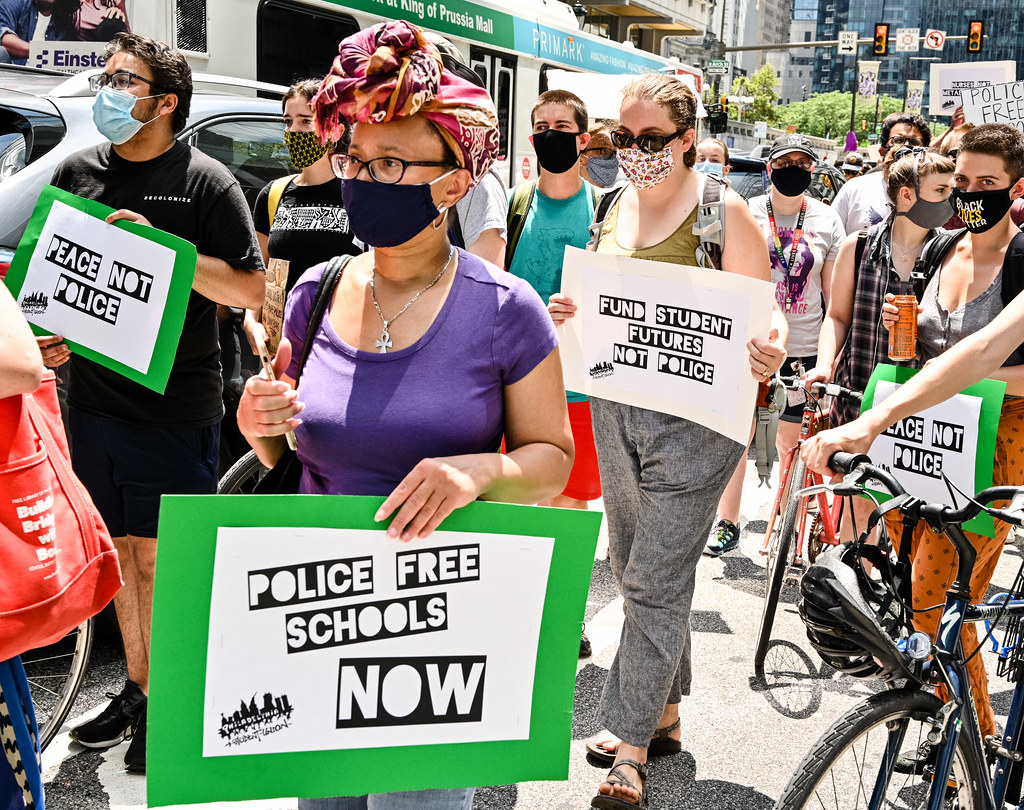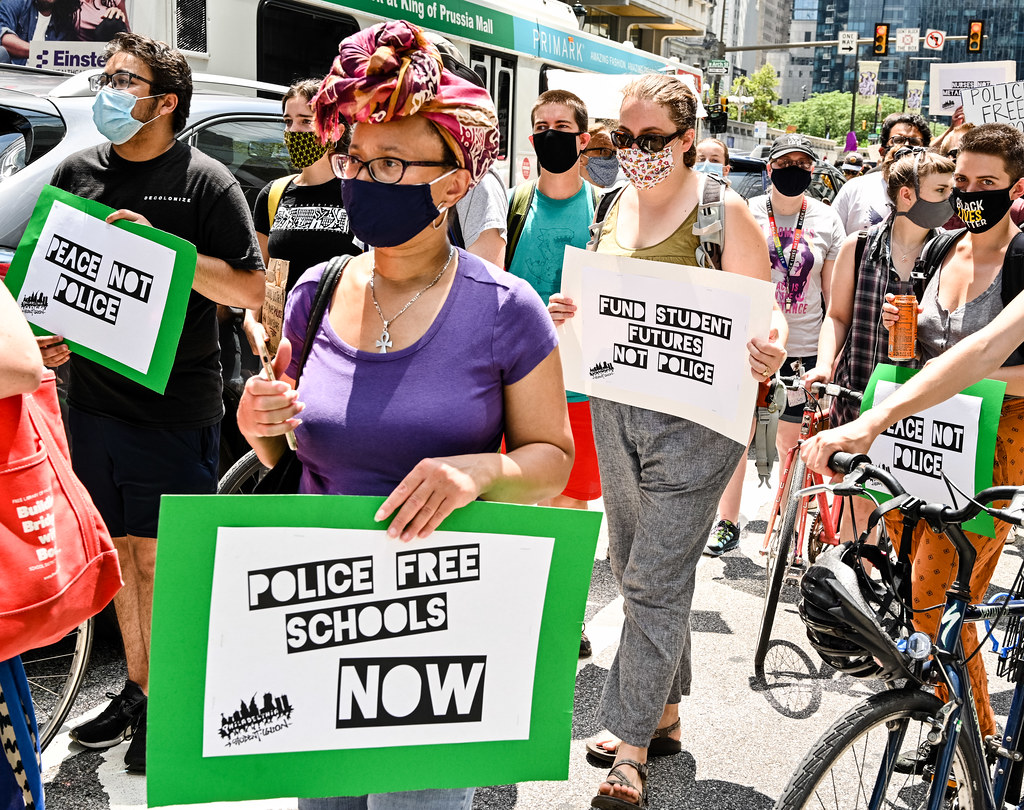New Massachusetts Law Paves the Way for Police-Free Schools
Massachusetts ended a mandate requiring cops in schools. Now advocates want Maryland and Florida, the remaining states with such laws, to follow suit.
Rachel M. Cohen | February 12, 2021


This article originally appeared on The Appeal, which hosted The Political Report project.
Massachusetts ended a mandate requiring cops in schools. Now advocates want Maryland and Florida, the remaining states with such laws, to follow suit and break the school-to-prison pipeline.
In Massachusetts, those who want police out of public schools are one step closer to making it happen. Lawmakers recently struck down a requirement that all school districts in the state have at least one “school resource officer”—a moniker for school cops. Now just two states—Florida and Maryland—have laws requiring police in schools, and advocates are pushing them to follow suit.
Massachusetts adopted the school police requirement in 2014 in response to the 2012 Sandy Hook Elementary shooting in Connecticut where 26 people were killed at school, including 20 young children. Since then, the number of cops assigned to work in Massachusetts schools has steadily grown, as school shootings nationwide have continued.
Last summer, in response to the racial justice protests sweeping the country after the police killing of George Floyd in Minneapolis, civil rights attorneys, parents and students across Massachusetts formed a coalition to press for the removal of the state mandate. Advocates pressured the legislature to address the school-to-prison pipeline, which refers to overly harsh school discipline measures that disproportionately affect students of color. Despite Black and Latinx students representing 27 percent of Massachusetts students in 2016, for example, they accounted for 64 percent of all school-based arrests.
The coalition’s demands were partially met with an omnibus police reform package that passed in December, which was watered down and full of compromises on issues like police training and facial recognition technology. Lawmakers agreed to remove the school police mandate, though they left it to local superintendents to decide whether to retain police; advocates wanted that power to rest with school boards, which tend to be more accountable to voters. Now some activists are gearing up to make the case for police-free schools to their local superintendents.
The legislation also calls for increased transparency, with annual reporting on school-based arrests, referrals to court, and the amount spent on school cops. “Schools have been supposed to be sharing that kind of information with the Department of Education since 2018, but there has been just a shameful lack of compliance,” said Leon Smith, executive director of Citizens for Juvenile Justice in Massachusetts.
Bay State residents were not the only ones pushing to reduce reliance on school police and redirect funds from law enforcement to restorative justice and mental health services. Last summer, school boards in cities like Minneapolis, Milwaukee, Denver and Portland, Maine, voted to end contracts with local police, and activists in Los Angeles pressed leaders to divest $25 million from the school police budget, and steer the funds to social workers and counselors. On the federal level, Democratic Representatives Ayanna Pressley and Ilhan Omar and Senators Chris Murphy and Elizabeth Warren introduced legislation to end federal funding for school cops. New bills introduced this year in states like Connecticut and Oregon would also phase out police from public schools.
—
School police presence has increased sharply over the last few decades. According to federal data, roughly 43 percent of public schools, and 71 percent of high schools reported the presence of armed law enforcement officers during the 2015-16 school year (the most recent year for which this data is available). While states can play a significant role in shaping school police policy, only Florida and Maryland currently have laws that explicitly require schools to have police or a security presence, according to an analysis prepared for The Appeal: Political Report by the Education Commission of the States.
In Florida, the law requires all districts to station at least one armed officer on every K-12 campus, and Maryland’s law requires every school to have either an assigned police officer or a plan for “adequate local law enforcement coverage.”
Both states passed their mandates after the 2018 Marjory Stoneman Douglas High School shooting, where a gunman opened fire and killed 17 people and injured 17 others in Parkland, Florida. Activists in Florida and Maryland are pushing hard now to repeal those state-level mandates, which they also opposed at the time of passage.
Local efforts to remove police from schools have existed in Howard, Montgomery, and Prince George’s counties in Maryland for several years. But a statewide coalition formed over the summer and made five key demands of lawmakers, among them to remove police from Maryland schools.
Two state delegates from Montgomery County responded with a legislative package to prohibit school districts from contracting with local law enforcement agencies, and to reallocate the $10 million in state funding currently set aside for school police into mental and behavioral health programs. The legislation would also disband the Baltimore City School Police Force, the only sworn school police force in the state.
While it’s unclear whether the bills will pass, Renuka Rege, a staff attorney with the Public Justice Center’s Education Stability Project in Baltimore, noted that past legislative efforts to arm teachers failed to gain traction in Maryland. That could be a sign that the school police reforms have a chance of success. Maryland’s 2018 law, she adds, was a “knee-jerk reaction” not only to Parkland, but also to a fatal school shooting in Maryland that occurred two days before the state’s Senate Budget and Taxation committee took up the bill.
In Florida, activists statewide have been reeling from a widely publicized January video of a school police officer body-slamming and handcuffing a Black teenager at a high school in Central Florida. The teen, Taylor Bracey, suffered memory loss, blurry vision and headaches after the incident, which is under investigation.
It’s not the first time Florida has earned national headlines for viral footage of arrests of young people at school. Body camera footage released last year showed a police officer arresting a 6-year-old girl in 2019 as she cried to be let go. The ACLU of Florida published a study in 2020 finding that the increase in Florida school police since 2018 led to an increase in school-based arrests. The ACLU urged a repeal of the state mandate and a return to local community discretion.
Maria Fernandez, a senior strategist for the Advancement Project’s #PoliceFreeSchools campaign, told the Political Report that the campaign is supporting youth efforts to remove police from school in cities like Philadelphia, Washington, D.C., Phoenix, New York City, New Orleans, and Oakland, California.
“Some folks have been working on these issues for a long time, and we also have been receiving more calls for help since the racial justice protests began,” said Fernandez. Many youth activists, she added, are focused on their fast-approaching city council budget fights.
“Money for school police often comes from the city budget, so folks are looking and thinking about that,” she said, pointing to New York City, where the mayor’s newly proposed 2022 budget includes $445 million for school police, compared to $100 million for school nurses and $180 million for school social workers. “You don’t need to be a math genius to do the analysis here,” wrote Alexa Valera, a Brooklyn high schooler and member of the Urban Youth Collaborative in a recent op-ed. “New York City is spending less money on supportive programming to help students than on police to criminalize us.”
—
In Massachusetts, advocates say next steps for them will involve ensuring that the transparency and reporting requirements of the 2020 reforms are honored, and they will continue to advocate for enhanced state funding of student mental health services.
“Looking at the pandemic, it’s just irresponsible and unacceptable to continue to throw money at cops when you know kids’ mental and social needs are greater than ever,” said Smith, of Citizens for Juvenile Justice.
Some activists in Massachusetts—including in Worcester, and New Bedford—are working to pressure their school superintendents to get rid of school police. In Framingham, leaders with the grassroots group Framingham Families for Racial Equity in Education say that after meeting with the superintendent, Robert Tremblay, he “made it clear he does not intend to remove SROs.” (A spokesperson for Tremblay did not respond to the Political Report’s request for comment.)
Cleopatra Mavhunga, an alumnus of Framingham Public Schools and a member of the Framingham Families for Racial Equity in Education, says despite the superintendent’s resistance, the group doesn’t plan on giving up its push for police-free schools.
“Right now the best thing we can do is rally the public,” she told the Political Report. “We need to have people understand what’s really going on.”


